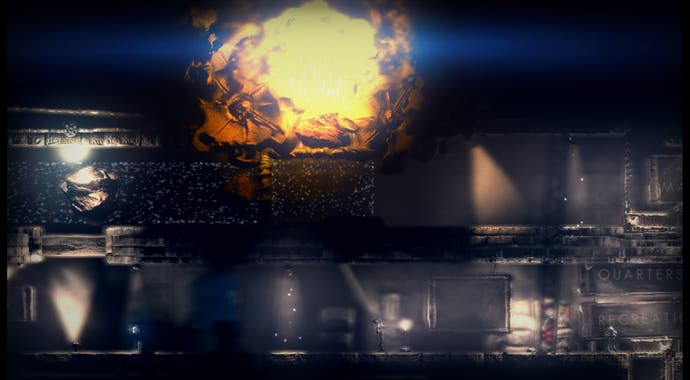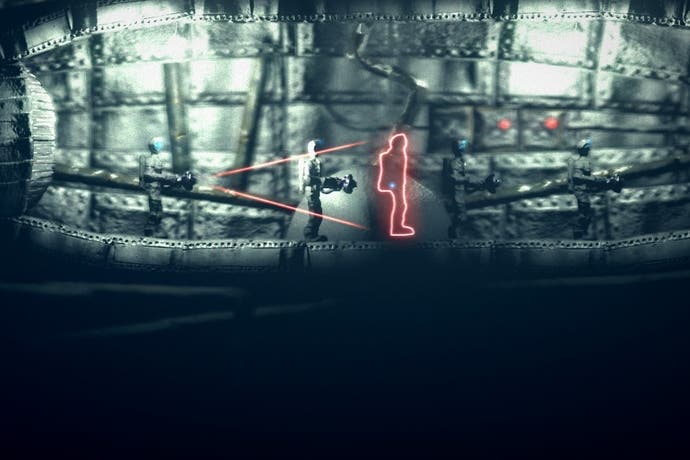The Swapper review
Soul sacrifice.
The precise moment of realisation in a puzzle game often has a peculiar kind of gravity to it - you can almost feel the tumblers rolling and dropping in your mind. No wonder we talk about pieces falling into place: I don't get it. Clunk. Got it.
If you enjoy that feeling, you'll love The Swapper - although you'll have to truly earn those instances of airy satisfaction as you pick over a series of ingenious, sometimes maddening challenges. You'll also have to use your victories to keep you warm through the chill of this fiercely atmospheric game - a tale of gloomy derelict space hulks and morally ambiguous technology that is told to the beat of a hundred, a thousand, perhaps a hundred thousand deaths.
This is serious sci-fi, concerned not so much with aliens and gadgetry, but the effects these things have on the soul. One of the story's fundamental questions, in fact, hinges on what the human soul is - or at least where it's hiding. The probing of neuroscience's MRIs have found no specific place in the brain where your consciousness definitely resides: there's no captain's bridge where there's always somebody on duty, ensuring that the story you tell yourself about your life is continuing uninterrupted. Facepalm's game plays with this idea by giving you the titular Swapper device, which allows you to shift your soul between your own body and a series of disposable clones you can conjure. Your task is to explore - solving puzzles to collect shining orbs that will open a series of doors for you - and to steadily piece the game's wider narrative together.

The Swapper's frosty philosophising doesn't initially seem a great match for the claymation art style, but it's actually an inspired blend. Your tinfoil spaceman seems terribly fragile as he navigates this derelict landscape of window putty and pipe-cleaners, while the hand-made approach speaks of craft and care and thrift - as does the rest of the game. This is a deftly constructed puzzler, in other words. Although it organises itself like a Metroidvania, there's little complex gear-gating and next to nothing in the way of backtracking as you work your way through caves and grottoes and up into the cold chambers of a dormant ship. Instead, it merely chooses to string its discrete puzzle chambers across a vast map so as to pace them out to best effect.
The puzzles themselves hinge on your cloning ability. A click of the right mouse button allows you to create and position up to four copies of yourself who will then mirror your actions exactly, whether you're walking, jumping, or even grabbing and pulling a crate. Because you're in sync with your various selves, placement is crucial: if a clone's five paces ahead of you, he's going to stay five paces ahead of you unless you run him off a cliff or walk him into an obstacle that holds him in place while you catch up. Beyond that, the left mouse button allows you to switch direct control between clones - if you can get a bead on them - and you can cancel clones out by either colliding with them, getting them killed, leaving a room, or passing through a sparkling beam of white light.
Even before the brain-teasing potential of such a limber system becomes apparent, the elegance of the controls makes a huge impression. There's a wonderfully gliding smoothness to the way you move the neon silhouette of a would-be clone across the landscape before placing it, as if you're extending the slide of a trombone. It's a lovely, frictionless counterpoint to your crumpled surroundings and the various glitchy filters laid over them.
The challenges you face, meanwhile, are compact and distinct. Each one lurks in its own room and can be solved in isolation, and each sees you using your clones in concert with increasingly tricksy environmental hurdles to reach a bundle of those orbs. The moment I first saw The Swapper's ability to create clones that move in sync, I started to dread the appearance of precision challenges that see you positioning yourself on multiple pressure plates like a cosmic line-dancer troupe. To be fair, there is a little of that kind of thing as the game unfolds, but not much - for the most part, Facepalm has far more imaginative treats planned.
There are a handful of mechanical additions that mix things up, for starters: coloured lamps either block your ability to clone, to swap, or both, while crates can be lugged onto switches and a relatively late development allows you to flip yourself between the floor and the ceiling, VVVVVV-style, at specific moments. With these ideas in the bank, Facepalm manages to wring an astonishing degree of variation from relatively simple pieces.
Its puzzles aren't just clever: they're fun to tinker with and they make you feel clever when you solve them, whether that's by a systematic exploration of the landscape at your disposal or a logic leap that you can never quite put into words. The best challenges in The Swapper have a distinct sense of dramatic structure and shape to them: the puzzle where you have to march backwards, laying down clones in front of you and sending your soul forwards through the line, or the puzzle where you have to use blocks and slopes and the fact that clones will grab and pull objects whenever you do to create rudimentary timers. There are puzzles that stop you from operating with a full complement of clones, puzzles that require you to fire your soul back and forth across the map as you get closer to your goal as if you're electricity moving through a circuit, and puzzles that need to be set up painstakingly, with clones locked in place on distant switches.
Sometimes even getting around the wider map can be a puzzle too. You quickly learn how to move at speed by leaping from one body to the next, and how to climb unscalable cliffs by projecting clones into the sky and warping between them. More than once you'll offer a prayer of thanks to canny developers who added a glorious burst of slo-mo to each deployment of the swapper, downplaying the twitchiness of your fingers in favour of the sharpness of your imagination.
And the most imaginative moments often have a sting to them, cropping up whenever you need to do yourselves in to reclaim bodies for further use elsewhere. Few puzzle games have as dark a heart as this one, in fact: you'll learn to murder your clones again and again and do it with barely a thought as bodies tumble from the sky and crumple, while others are left behind and exploded as you shut the door on them. The intrinsic bone-chill of The Swapper ultimately comes from the things it does in your own mind - the way it encourages you to see yourself as a disposable resource, the way it pushes you towards a thousand casual betrayals where individual vessels are sacrificed.
And why are they sacrificed? So that the elusive soul can progress. It is one made from many, after all - and often the many just don't seem to matter.









